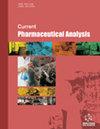Advancements in the Analytical Methods for Ripasudil Hydrochloride Hydrate and Timolol Maleate: A Recently Approved FDC
IF 1.5
4区 医学
Q4 PHARMACOLOGY & PHARMACY
引用次数: 0
Abstract
Fixed-dose combinations (FDCs) combine two or more medications into a single dosage form. Several benefits, including impending therapeutic efficacy, a decline in episodes of adverse drug effects, pharmacokinetic advantages, a decrease in pill burden, a reduction in the dose of individual medications, and a reduction in the emergence of drug resistance, justify their acceptance. For the treatment of increased intraocular pressure (IOP) in adult patients with open-angle glaucoma or ocular hypertension, an FDC eye drop formulation, including ripasudil hydrochloride hydrate (0.4%W/V) and timolol maleate (0.5%W/V) has just received approval. No analytical method has been reported thus far for this newly approved combination. Thus, this review collected and simplified information on reported analytical techniques and physicochemical and biological properties for the above-cited FDCs. The authors have explored various authenticated scientific journals and presented simplified information to meet the objectives. In this study, the reported methods are spectroscopy (nil, 23%), HPTLC (nil, 10%), HPLC (100%, 61%), hyphenated techniques (nil, 6%) and electrophoresis methods (nil, 6%) for ripasudil hydrochloride hydrate and timolol maleate, respectively. Analysts using such comprehensive data might develop a method for analyzing the recently approved FDCs.盐酸Ripasudil水合物和马来酸Timolol分析方法的进展:一种最近批准的FDC
固定剂量组合(FDCs)将两种或两种以上的药物组合成一种单一的剂型。一些好处,包括即将到来的疗效、药物不良反应的减少、药代动力学优势、药丸负担的减少、个别药物剂量的减少以及耐药性的出现,都证明了它们的接受性。为了治疗患有开角型青光眼或高眼压的成年患者的眼压升高,一种FDC滴眼剂刚刚获得批准,其中包括盐酸利帕地尔水合物(0.4%W/V)和马来酸噻吗洛尔(0.5%W/V)。到目前为止,还没有关于这种新批准的组合的分析方法的报告。因此,本综述收集并简化了关于上述FDCs的分析技术、物理化学和生物特性的报告信息。作者探索了各种经过认证的科学期刊,并提供了简化的信息以实现目标。在本研究中,已报道的方法分别为盐酸利帕苏迪水合物和马来酸噻吗洛尔的光谱学(无,23%)、HPTLC(无,10%)、HPLC(100%,61%)、联用技术(无,6%)和电泳方法(无,60%)。使用这些全面数据的分析师可能会开发出一种分析最近批准的FDC的方法。
本文章由计算机程序翻译,如有差异,请以英文原文为准。
求助全文
约1分钟内获得全文
求助全文
来源期刊
CiteScore
1.50
自引率
0.00%
发文量
85
审稿时长
3 months
期刊介绍:
Aims & Scope
Current Pharmaceutical Analysis publishes expert reviews and original research articles on all the most recent advances in pharmaceutical and biomedical analysis. All aspects of the field are represented including drug analysis, analytical methodology and instrumentation. The journal is essential to all involved in pharmaceutical, biochemical and clinical analysis.

 求助内容:
求助内容: 应助结果提醒方式:
应助结果提醒方式:


